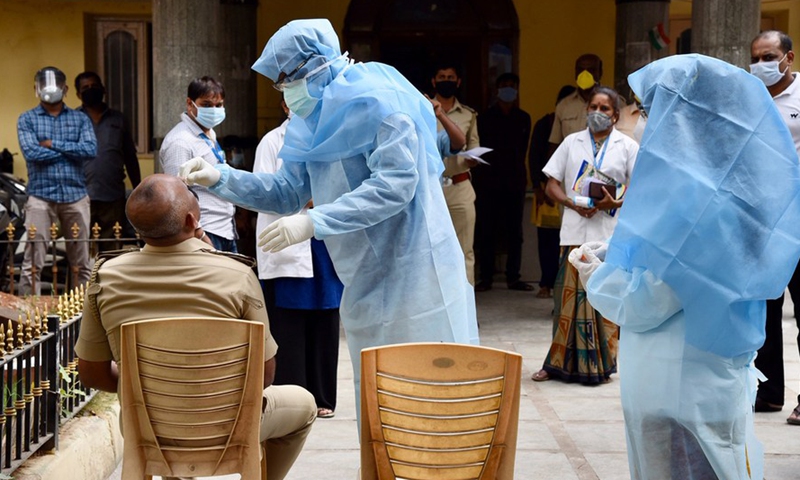Stranded near crematorium in New Delhi, Chinese man hopes to find way back home
By Liu Caiyu Source:Global Times Published: 2020/7/2 12:29:46

An Indian health worker takes a swab sample of a policeman, as new cases of COVID-19 were reported from a police station in Bangalore, India, June 16, 2020. (Str/Xinhua)
Every day, Zhou Ze (pseudonym), witnesses corpses being brought here one by one, and then sees them being burned with firewood.
Zhou seems quite calm when talking about the crematorium in New Delhi, where he has been staying for more than three months, as if he has become accustomed to the frightening scenes.
"Sometimes the air is filled with a burning smell like roasted lard," he said.
Every one or two hours, corpses are transported to the open-air crematorium, which is surrounded by residential houses. Sometimes eight or 10 corpses are brought here by ambulances in one day and then burned to ashes.
Although it is hard to say how many of them had died of novel coronavirus, many assume that the number of confirmed COVID-19 cases in India is far higher than what the official data shows.
When a confirmed case was found in a community two kilometers away from where Zhou was living, residents at the community were not required to take nucleic acid tests, or to wear masks whengoing out.
"I don't know if anyone in my community was diagnosed with COVID-19, but I often see ambulances and police cars coming, maybe for COVID-19 patients," Zhou told the Global Times.
India has announced a national lockdown since March, and has extended it at least five times. At first, Zhou said there were policemen driving cars and patrolling the streets daily, urging residents to observe social distancing, but later, the police seldom appeared, and people also started removing their masks.
Latest data from the Ministry of Health of India showed that India had 18,600 new confirmed cases and 507 new deaths on Wednesday. The total confirmed cases have surpassed 585,000.
Although its daily number of new cases continues to break records, India is considering lifting its lockdown.
Out of fear of being infected, Zhou has remained in his residence, which is just 100 meters away from the crematorium, and doesn't dare step outside all day, like most Chinese stranded in India.
In the first few days of lockdown, Zhou was invited by an Indian family downstairs to eat together, but later, he chose to cook for himself.
"I vomit when I see the sticky meal that they eat with their hands. We have totally different eating habits," he said. Now, Zhou occasionally buys some eggs and chicken from the vendors downstairs to cook his meals.
Zhou came to India to work, and was drawn by the promise of a monthly salary of some 30,000 yuan. But since his normal work was postponed due to the epidemic, he has not received any pay for three months.
With the assistance of the Chinese Embassy in India, thousands of Chinese people stranded in the country returned home on five charter flights in June. The Global Times learned from insiders that the flights are open to tourist visa holders, students and Chinese citizens who are in difficulty while staying in India.
Zhou, who holds a business visa, applied for a charter flight to return to China but was not accepted.
It is reported that some 3,000 Chinese people are still waiting to leave from India. Facing the deteriorating epidemic situation in the country, where anti-China sentiment is also on the rise, stranded Chinese people are growing more anxious than before.
"Friends in India have been telling us not to go out, fearing that we might be attacked," Xiao Chen, who has been staying in Goa on the southwestern coast of India since February, told the Global Times.
Xiao Chen, like other Chinese in India, has not stepped out of her house for a long time, and usually asks her Indian friends to help buy food for her, only daring to eat it after spraying it with large amounts of disinfectant.
She became more anxious after noticing that Indian media has recently started to whip up anti-China sentiment, as well as reports that said the Indian government would ban Chinese application software, including WeChat, the messenger app most frequently used by Chinese people.
Worried that she would lose contact with family members in China, Xiao Chen has already downloaded a VPN.
Many Chinese in India have made similar preparations, while others began to use WhatsApp instead. The video and audio functions on WeChat were unavailable on Wednesday, some Chinese in India reached by the Global Times said.
Fear and anxiety have been bringing Chinese people together on social media. They have set up various groups on WeChat, through which they share information about international flights bringing them home, discuss possible ways to return via land routes and seek advice from the Chinese Embassy.
Since the announcement of India's lockdown, some Chinese airlines have said that they will resume operations, but consecutive extensions of the lockdown have dashed hopes of returning home for many.
Zhou has booked a plane ticket from India to Shanghai on July 17. He is hoping that India will lift its lockdown and international flights will resume, and the sight of corpses being cremated in the open will become a distant memory.
Posted in: SOCIETY